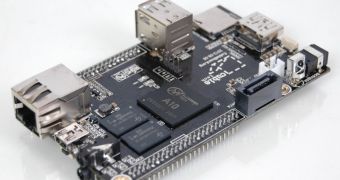Mini board PCs really have taken off in popularity, even though they aren't likely to ever replace actual systems. Being so small, what points they lose in performance they gain in terms of novelty, customizability and, consequently, potential for a widespread range of uses.
Indeed, even though the Raspberry Pi, currently the most popular such product, has been out for a while, it hasn't managed to wear off the novelty factor on its own.
Thus, the Cubieboard is going to benefit from this perk fully, even though its price is a bit higher than that of the Pi.
For those who don't remember, Raspberry Pi was advertised as a $25 PC (20 Euro), but its tag is closer to $35 (28 Euro), and that's without shipping costs.
Cubieboard has a tag of $49 (39 Euro), which means it will reach around $50-60 (40-47 Euro), again, without shipping costs.
That said, the money will net you a 1 GHz Allwinner A10 Cortex A8 central processing unit, as well as the Mali-400 GPU and 1 GB of RAM (random access memory).
There is supposedly a pair of MMC (MultiMediaCars) slots available as well, but the photo only shows one, so the company either scrapped the second or will only have it in the final version. On that note, the USB OTG mentioned in the Wiki is absent as well.
The features that aren't missing, not counting the ones already mentioned, are as follows: two USB hosts, an IR sensor, 96 extender pins (for solders), a SATA port, 1080p HDMI and Ethernet. As for software, Cubieboard is good enough for several versions of Android and Linux.
Cubieboard will start shipping this week, but only to select developers. Eventually, mass production will start as well, but we can't guess when. In the meantime, there is a third mini PC that could prove interesting: VIA's Avatar APC 8750.

 14 DAY TRIAL //
14 DAY TRIAL //